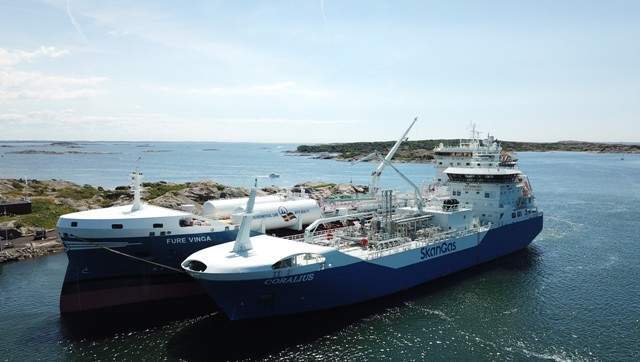Gasum’s subsidiary Skangas has signed an agreement with parts of the Gothia Tanker Alliance to supply liquefied natural gas (LNG) as fuel.

Image: Skangas’s vessels. Photo: Courtesy of Skangas.
The new agreement comprises current as well as new vessels with LNG propulsion soon to come.
The main Swedish shipping companies that will get the advantage of the supply agreement with Skangas are Furetank Rederi AB, Erik Thun AB and Rederi AB Älvtank.
These shipping companies have invested in total six new LNG fueled vessels and together with the existing Fure West they are all jointly operated by the Gothia Tanker Alliance.
The Swedish Shipowners’ Association is actively contributing to reduce any negative environmental impact of the shipping industry. Their goal is zero emissions within 2050.
Furetank managing director Lars Höglund said: “Investing in LNG fueled vessels contributes along these lines. For newbuilds we focus on energy efficiency and innovations. Together with our choice of cleaner fuel we are experiencing a major reduction in our CO2 emissions, not to forget the reductions in particulate matters and NOX.”
Fuel supply from land or off shore
Wherever a LNG vessel might need fuel Skangas will be delivering. The delivery chain consists of trailer trucks, extensively being used for bunkering operations in ports, bunkering from terminals, as well as Skangas’s bunker vessel Coralius. The bunkering ship-to-ship by Coralius may take place at anchorage off Gothenburg in Sweden, off Skaw in Denmark, off shore Norway or in ports during cargo operations.
Skangas sales and marketing director Tommy Mattila said: “Skangas is very happy with the agreement and to continue our relationship with Furetank and the rest of the Gothia Tanker Alliance.
“Being trusted to supply LNG also for the future vessels is a confirmation that we are delivering as expected. We will continue investing and improving to meet ship owners’ demands and expectations.”
Liquefied Natural Gas (LNG), is the cleanest available marine fuel, one that is rapidly becoming more commonly used as a cost-effective alternative. LNG is suitable for all vessel types, including ferries, passenger ships, tankers, bulk, supply and containerships. LNG offers several benefits by reducing local and global pollution.
Switching to LNG completely removes SOx and particulates and reduces NOx emissions by up to 85%. In addition, LNG reduces CO2 emissions by at least 20%. Use of LNG as marine fuel result in compliance with current and forthcoming IMO and EU regulations.
Source: Company Press Release
